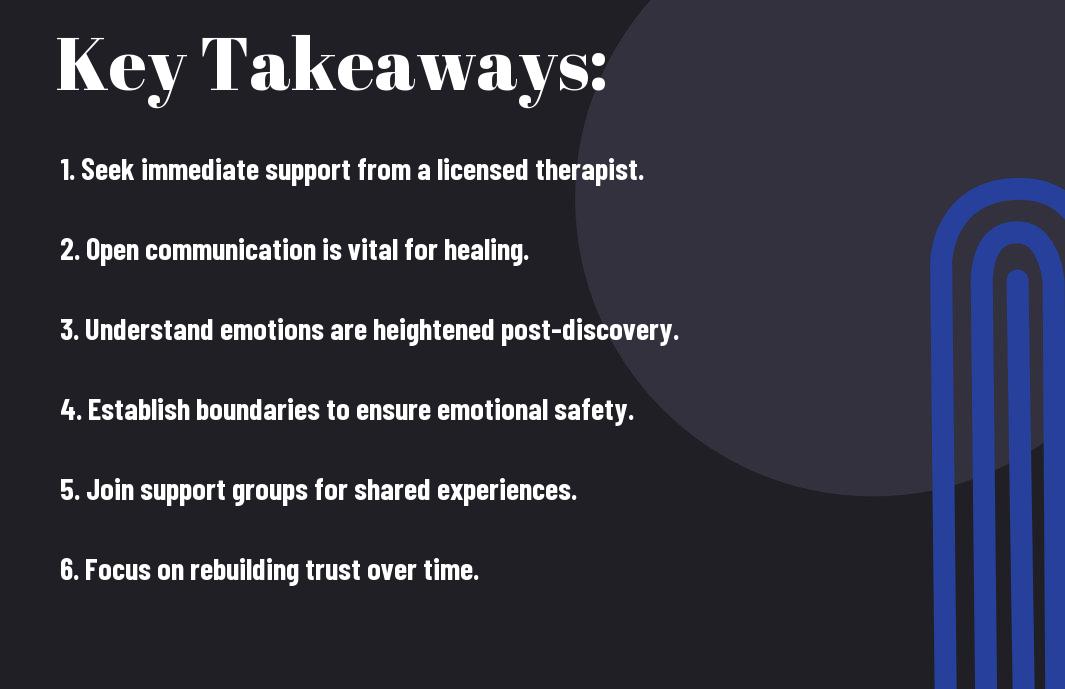A discovery of an affair can leave you feeling lost and overwhelmed, but seeking immediate support through counseling can be a turning point. You should consider reaching out to a professional therapist experienced in infidelity issues, as they can provide the guidance needed to navigate your emotions and make informed decisions. Local support groups or online forums can also offer valuable community resources to help you process your feelings. Understanding your options is key; you are not alone in this journey of healing and recovery.
Key Takeaways:
- Emergency counseling can provide immediate support for individuals processing the emotional aftermath of an affair.
- Seek professionals who specialize in infidelity recovery to navigate the complex feelings and thoughts that arise.
- Consider involvement in support groups, either online or in-person, to connect with others experiencing similar challenges.
- Open communication with your partner is important, even while receiving counseling, to rebuild trust and understanding.
- Establish personal self-care practices to help manage stress during this emotionally taxing time.
- Take time to assess your feelings and desires regarding the relationship before making any long-term decisions.
- Research available resources, including books and therapy programs, that focus on healing after infidelity.

Understanding the Impact of Infidelity
To navigate the complex emotions following the discovery of infidelity, it’s important to understand its profound impact on you and your relationship. The shock and betrayal can manifest in numerous ways, affecting your mental and physical well-being. Recognizing these effects is the first step toward healing and making informed decisions about your future.
Emotional Reactions
For many, discovering infidelity triggers a whirlwind of emotions, including anger, sadness, and confusion. It’s common to feel hurt and betrayed, often leading to a sense of loss and self-doubt. Understand that these emotional reactions are natural and need to be processed to move forward.
Relationship Dynamics
Along with emotional turmoil, infidelity disrupts the existing dynamics of your relationship. Trust is broken, communication often becomes strained, and the foundation of your partnership may feel severely compromised. It’s important to assess these changes critically, as they can dictate your path towards either reconciliation or separation.
To effectively address these relationship dynamics, you must openly communicate your feelings and concerns with your partner. Discussing the breach of trust can be uncomfortable, yet doing so is important for healing. Establishing honest dialogue allows you to clarify boundaries and expectations, potentially rebuilding a stronger bond. However, neglecting these conversations can further damage your relationship, creating a cycle of resentment. Focus on highlighting positive changes you both wish to implement while being aware of the challenges ahead.
Seeking Professional Help
You should consider seeking professional help when confronted with the aftermath of an affair. Professional counselors can provide the support and guidance necessary to navigate the emotional turmoil that often accompanies infidelity. They can help both partners explore their feelings, understand the underlying issues, and work towards rebuilding trust and communication in the relationship.
Types of Counseling Services
- Individual Counseling – One-on-one sessions to process emotions.
- Couples Therapy – Joint sessions focused on relationship dynamics.
- Support Groups – Community support from others in similar situations.
- Online Counseling – Virtual sessions for convenience.
- Group Therapy – Shared experiences in a group setting.
Assume that finding the right counseling service is important for effective healing.
Must-read books for navigating infidelity recovery
How to Choose a Counselor
Choose a counselor who specializes in infidelity and relationship issues. It’s vital to look for credentials, experience, and a compatible approach to therapy. A personal connection with your counselor can significantly enhance your healing process.
A skilled counselor will not only address the emotional fallout of infidelity but also guide you toward constructive solutions. Look for someone with experience in relational issues, strong communication skills, and an ability to create a non-judgmental space. Ensure the counselor’s approach aligns with your values, and establish a rapport that supports open and honest dialogue. Ultimately, your comfort and trust in your counselor are paramount for the healing journey.

Support Systems for Individuals and Couples
Once again, you may find yourself seeking comfort and stability in the aftermath of discovering an affair. Building a supportive network is necessary during this difficult time, as it can provide emotional relief, practical guidance, and validation. Your support system can include trusted family members, close friends, and professionals who understand the complexities of healing after infidelity.
Heal from infidelity with confidential online therapy
Friends and Family Roles
Before approaching your friends and family for support, consider their potential reactions and how they might influence your healing journey. Loved ones can offer valuable perspectives, a listening ear, and emotional encouragement. However, it’s important to choose those who can remain non-judgmental and supportive, helping you navigate your feelings and decisions without exacerbating the pain.
Support Groups and Resources
Above all, connecting with support groups and resources can be incredibly beneficial for you during this time. These communities offer a safe space to share experiences, gain insights, and feel less isolated in your struggles.
Groups designed for individuals and couples dealing with affairs can provide shared understanding and coping strategies that are specifically tailored to your situation. You’ll discover that engaging with others who are in a similar phase of healing enables you to process your emotions more effectively. Many resources, both online and in-person, also offer professional guidance and structured programs, allowing you to address the complex feelings of betrayal and disappointment while helping you rebuild trust and intimacy, whether as an individual or couple.

Communication Strategies for Healing
Many couples navigating the aftermath of an affair will benefit from effective communication strategies that foster healing and understanding. These strategies can help you rebuild trust and initiate open conversations about emotions and expectations. For detailed insight, consider exploring Recovering from the trauma of infidelity.
Open Dialogue Techniques
After the discovery of an affair, establishing open and honest dialogue between partners becomes necessary. Use “I” statements to express your feelings without assigning blame, allowing both of you to share your thoughts and emotions openly. Incorporating active listening can also help ensure that each partner feels heard and validated during these critical conversations.
Setting Boundaries
By creating clear boundaries, you can establish a safe space to navigate your feelings and expectations post-affair. This includes discussing the limits of future interactions with others and setting guidelines for communication and emotional intimacy.
Plus, effective boundary-setting should include positive behaviors such as *consistency, accountability,* and *transparency*. As you define these boundaries together, it’s vital to agree on how you will address any violations and what consequences may arise. This proactive approach not only protects both partners but also encourages a greater sense of security and *trust*, allowing you to rebuild your relationship on a stronger foundation.
Rebuilding Trust After Betrayal
Your journey towards rebuilding trust following an affair may seem daunting, but it is entirely possible. It requires open communication, consistent actions, and a mutual commitment to healing. Re-establishing trust is not a quick fix; it takes time, patience, and a willingness to address underlying issues. By prioritizing honesty and addressing the pain caused by betrayal, you can create a foundation for a stronger relationship moving forward.
Steps Towards Forgiveness
Along the path to forgiveness, it’s necessary to acknowledge your feelings and express them openly to your partner. This means allowing yourself to grieve the loss of trust while also being open to discussions about the affair. Creating a space for honesty fosters understanding and paves the way for healing. By choosing to let go of resentment, you can begin the transformative journey towards forgiveness.
Re-establishing Connection
Before rebuilding your relationship, focus on re-establishing the emotional connection that may have been damaged. Engage in activities that both you and your partner enjoy, and prioritize spending quality time together. This shared experience can open up avenues for dialogue and encourage an atmosphere of vulnerability. The effort you both invest in rekindling your bond will not only help in rebuilding trust but also enhance intimacy.
The process of re-establishing connection requires sincere commitment and willingness to be vulnerable. Make it a priority to engage in deep conversations where both of you can express your thoughts and feelings about the affair and the future. It could be beneficial to schedule regular check-ins where you openly discuss your emotional state and the relationship. Taking small, thoughtful steps to rekindle joy and emotional intimacy can significantly strengthen your bond and create a safer environment for trust to grow again.
Moving Forward: Making Decisions
Keep in mind that moving forward after discovering an affair involves carefully considering your options and the future of your relationship. It is imperative to evaluate whether the foundation of your bond is strong enough to withstand the challenges ahead. Taking this time to reflect will help you decide if reconciliation or separation is the best path for you.
Assessing Relationship Viability
By assessing the viability of your relationship, you can identify whether it holds potential for healing and restoration. Analyze factors such as trust, communication, and mutual willingness to work on underlying issues. This honest assessment will guide you in making the best decision for your emotional well-being and future happiness.
Next Steps for Individuals
Along your journey of recovery, it is imperative to focus on your individual needs and growth. Engage in self-reflection, seek support from trusted friends or a therapist, and prioritize your mental health. This period of introspection allows you to understand your feelings and the role you want to play in your future, whether that involves staying in the relationship or moving on.
Another important step in this process is to set boundaries and clarify your needs. Focus on personal healing, which may involve practicing self-care and exploring new interests that promote your emotional stability. Reach out for professional guidance to navigate your feelings and adjust to change. Actively engage in conversations that help you redefine your relationship goals, offering you clarity and direction as you decide your next moves.
Summing up
With these considerations, you have the tools to navigate the tumultuous aftermath of discovering an affair. Seeking emergency counseling can provide you with a safe space to process your emotions and gain clarity. It’s imperative to reach out to professionals who specialize in infidelity, as they can guide you through the complexities of your situation. Whether you choose to work on healing personally or with your partner, knowing where to turn for support is a vital step toward recovery and rebuilding trust.
FAQ
Q: What is emergency counseling after discovering an affair?
A: Emergency counseling after discovering an affair involves immediate therapeutic support for individuals or couples experiencing the emotional turmoil that follows infidelity. This type of counseling aims to provide a safe space for processing feelings, understanding the impact of the affair, and beginning the journey toward healing or making decisions about the relationship’s future.
Q: When should I seek emergency counseling following an affair?
A: It’s advisable to seek emergency counseling as soon as the affair is discovered or as soon as you feel overwhelmed by emotions such as betrayal, anger, or confusion. Early intervention can help individuals better process their feelings and communicate effectively with their partner, potentially preventing further relationship damage.
Q: How can emergency counseling help in navigating the aftermath of an affair?
A: Emergency counseling provides tools and strategies to cope with the intense emotions that arise after an affair. A trained counselor can help individuals understand their feelings, address the factors leading to the affair, and facilitate constructive communication between partners. This support can be vital in making informed decisions regarding the future of the relationship.
Q: What should I look for in a counselor for emergency counseling after an affair?
A: When seeking a counselor for emergency counseling post-affair, consider looking for a licensed therapist who specializes in relationship issues and infidelity. Look for someone with positive reviews or recommendations and ask about their experience in dealing with infidelity. It’s important that you feel comfortable and safe with your counselor to foster open communication during these sensitive discussions.
Q: What outcomes can I expect from engaging in emergency counseling after an affair?
A: While outcomes may vary, engaging in emergency counseling can lead to a deeper understanding of the underlying issues in the relationship, improved communication skills, and emotional resilience. Some couples may rebuild their trust and strength as a partnership, while others may find clarity about ending the relationship. Ultimately, counseling is designed to empower individuals to make informed choices about their emotional well-being.
